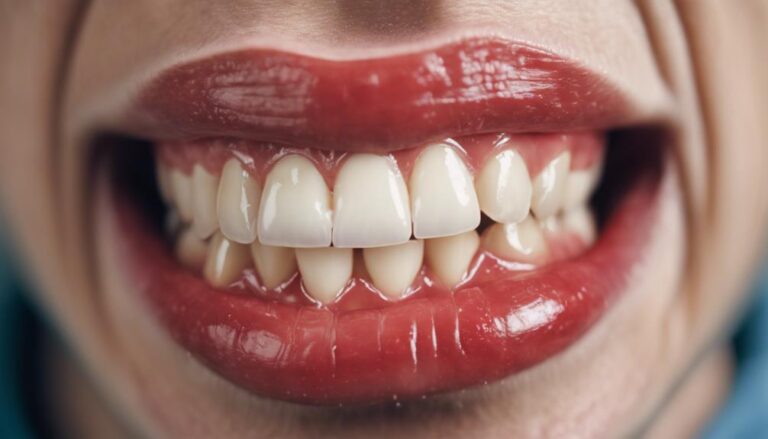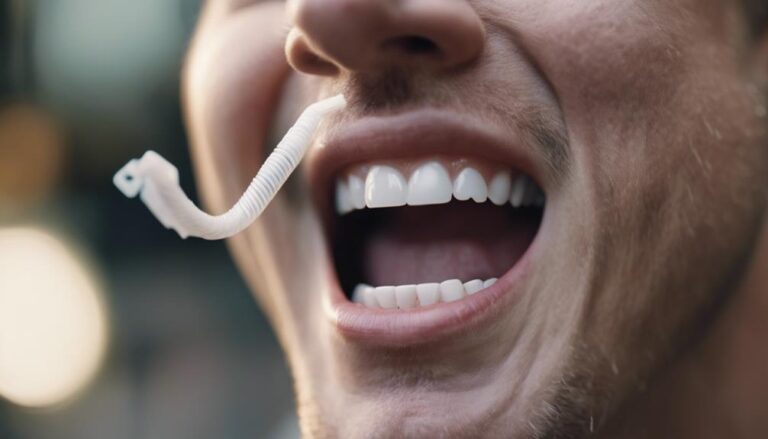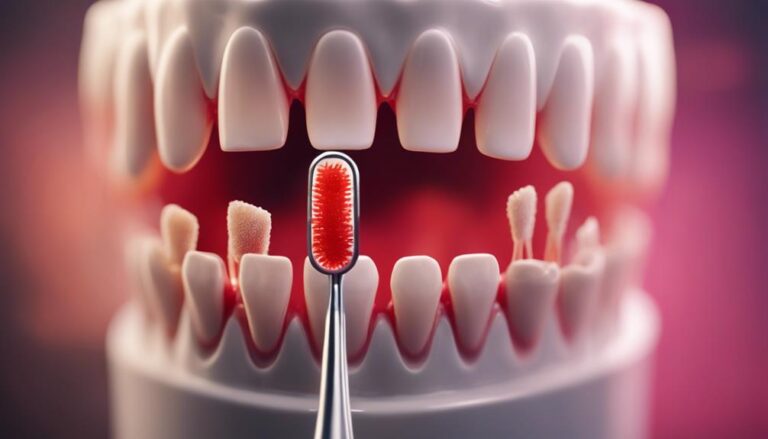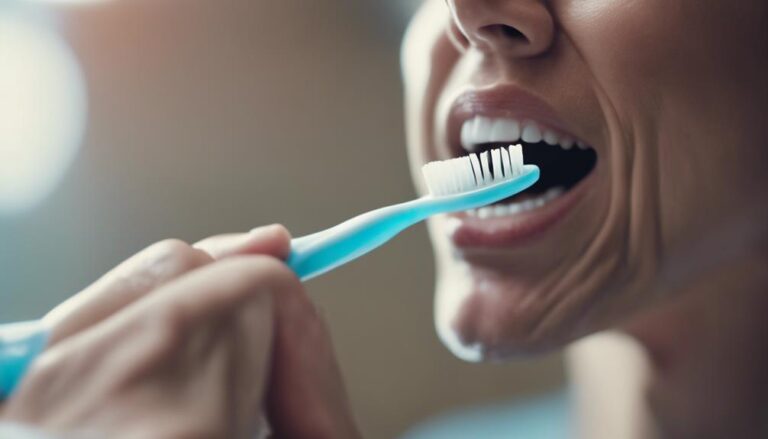Maintaining good oral hygiene is crucial. Brush twice daily to remove plaque and prevent gum disease. Floss everyday to eliminate food particles and plaque between teeth. Use a soft-bristled toothbrush with gentle, circular motions to protect gums. Consider an alcohol-free, antibacterial mouthwash for fresh breath. Remember, healthy gums play an essential role in preventing bad breath.
Key Takeaways
- Good oral hygiene prevents gum disease, reducing the risk of bad breath.
- Brushing and flossing daily removes plaque, a major cause of gum diseases.
- Using antimicrobial mouthwash helps control bacteria causing bad breath.
- Regular dental cleanings remove tartar buildup and detect early signs of gum problems.
- Healthy gums are essential for fresh breath; maintain oral hygiene to prevent bad breath.
Importance of Oral Hygiene
Maintaining proper oral hygiene is essential for preventing gum disease and bad breath. Brushing techniques play a vital role in removing plaque, a sticky film of bacteria that forms on teeth. To guarantee effective plaque removal, it’s advised to brush twice a day for at least two minutes each time. Using a soft-bristled toothbrush with gentle, circular motions helps prevent damage to the gums while efficiently cleaning the teeth.
Additionally, incorporating flossing into your daily oral care routine offers a multitude of benefits. Flossing helps remove food particles and plaque from between the teeth and along the gumline, areas where a toothbrush may not reach. This helps prevent gum disease by reducing the risk of inflammation and infection. Regular flossing also contributes to fresher breath by eliminating bacteria and food debris that can lead to odors.
Bacterial Growth in Mouth
Bacteria thrive in the warm and moist environment of the mouth, contributing to various oral health issues such as gum disease and bad breath. Maintaining a healthy bacterial balance in the mouth is vital for good oral health.
To prevent harmful bacterial growth, proper oral hygiene practices are essential. Brushing teeth at least twice a day, flossing daily, and using an antimicrobial mouthwash can help in preventing bacteria from proliferating.
Mouthwash benefits include reaching areas in the mouth that a toothbrush may miss, reducing plaque buildup, and freshening breath by killing odor-causing bacteria. It’s important to choose a mouthwash that’s alcohol-free and contains antibacterial properties for excellent oral health.
Plaque and Tartar Buildup
Plaque and tartar buildup pose significant risks to oral health, leading to complications like gum disease and persistent bad breath. As a dental professional, I emphasize the importance of understanding how these issues can impact your overall oral health. Here are three key points to keep in mind:
- Preventing Decay: Plaque is a sticky film of bacteria that constantly forms on your teeth. If not removed regularly through proper brushing and flossing, it can harden into tartar, which provides an ideal environment for bacteria to thrive and contribute to tooth decay. Maintaining good oral hygiene practices is vital in preventing decay and the buildup of plaque and tartar.
- Regular Dental Cleanings: Even with excellent oral hygiene at home, professional dental cleanings are essential. Dental cleanings help remove hardened tartar that can’t be eliminated through regular brushing alone. These cleanings also allow your dentist to detect any early signs of gum disease and provide appropriate treatment.
- Overall Oral Health: Addressing plaque and tartar buildup not only prevents bad breath but also lowers the risk of developing more severe oral health issues like gum disease. By staying proactive with preventive measures such as regular dental cleanings, you can maintain a healthy smile and prevent complications down the road.
Inflammation of Gums
Regularly inflamed gums, known as gingivitis, can indicate the presence of underlying oral health issues. Gingivitis is characterized by red, swollen gums that may bleed easily, especially during brushing or flossing. It’s typically caused by a buildup of plaque, a sticky film of bacteria that forms on teeth. To prevent gingivitis, it’s vital to maintain good oral hygiene practices such as regular brushing, flossing, and dental check-ups.
Preventive measures play a key role in managing gingivitis. Proper oral hygiene is essential, including brushing teeth at least twice a day with fluoride toothpaste and flossing daily to remove plaque and food particles. Additionally, using an antimicrobial mouthwash can help reduce bacteria that cause gum inflammation. Regular dental cleanings are also important to remove any hardened plaque or tartar that can’t be removed through regular brushing.
If gingivitis is left untreated, it can progress to more severe forms of gum disease. Hence, early detection and prompt gingivitis treatment are essential in preventing complications and maintaining good oral health.
Impact on Breath Freshness
Maintaining healthy gums is essential for ensuring fresh breath and overall oral hygiene. When gum disease is present, it can have a significant impact on breath freshness. Here are three key factors to take into account:
- Mouthwash Benefits: Using an antibacterial mouthwash can help reduce the bacteria in your mouth that contribute to bad breath. It’s important to select a mouthwash that targets plaque and gingivitis to combat the effects of gum disease on breath odor. Adding mouthwash to your daily oral hygiene routine can be an effective way to freshen your breath.
- Dietary Habits, Impact: What you eat can also influence the freshness of your breath. Foods high in sugar and carbohydrates can fuel the bacteria in your mouth, leading to bad breath. Conversely, consuming crunchy fruits and vegetables can help clean your teeth and stimulate saliva production, which assists in maintaining your breath fresh.
- Proper Brushing and Flossing Techniques: Brushing and flossing correctly are crucial for eliminating food particles and plaque that can cause bad breath. Being mindful of cleaning between teeth and along the gumline can help prevent gum disease and preserve fresh breath.
Frequently Asked Questions
Can Gum Disease Be Contagious Through Kissing or Sharing Utensils?
Gum disease is not directly contagious through kissing or sharing utensils. It’s caused by poor oral hygiene leading to bacterial growth. Regular dental check-ups, proper brushing, and flossing are key for prevention and control.
Are There Any Natural Remedies to Prevent Gum Disease?
To prevent gum disease naturally, I incorporate herbal remedies like tea tree oil and aloe vera. I prioritize prevention techniques such as regular dental check-ups, proper dietary habits, and consistent oral hygiene. These practices help maintain healthy gums.
Does Smoking or Vaping Worsen Gum Disease Symptoms?
Smoking and vaping exacerbate gum disease symptoms, impacting diet and stress levels. Long-term effects on oral health are significant. Despite knowing these risks, some still indulge in habits that harm their well-being.
Can Hormonal Changes During Pregnancy Affect Gum Health?
Hormonal fluctuations during pregnancy can impact gum health. Increased progesterone levels can make gums more sensitive to bacteria, causing inflammation and potential gum disease. Regular dental check-ups and good oral hygiene are essential during this time.
How Often Should I Replace My Toothbrush to Prevent Gum Disease?
Like a diligent gardener tending to delicate flowers, I replace my toothbrush every three months to maintain peak oral hygiene. This routine helps me combat plaque buildup and guarantees my toothbrush bristles are effective.
Conclusion
In summary, maintaining good oral hygiene is essential in preventing gum disease and bad breath.
By addressing bacterial growth, plaque and tartar buildup, and inflammation of the gums, we can improve our overall oral health and breath freshness.
Remember, a healthy smile not only looks good but also contributes to a more pleasant and confident presence in social interactions.
So, let’s keep those pearly whites shining bright for a refreshing change!






